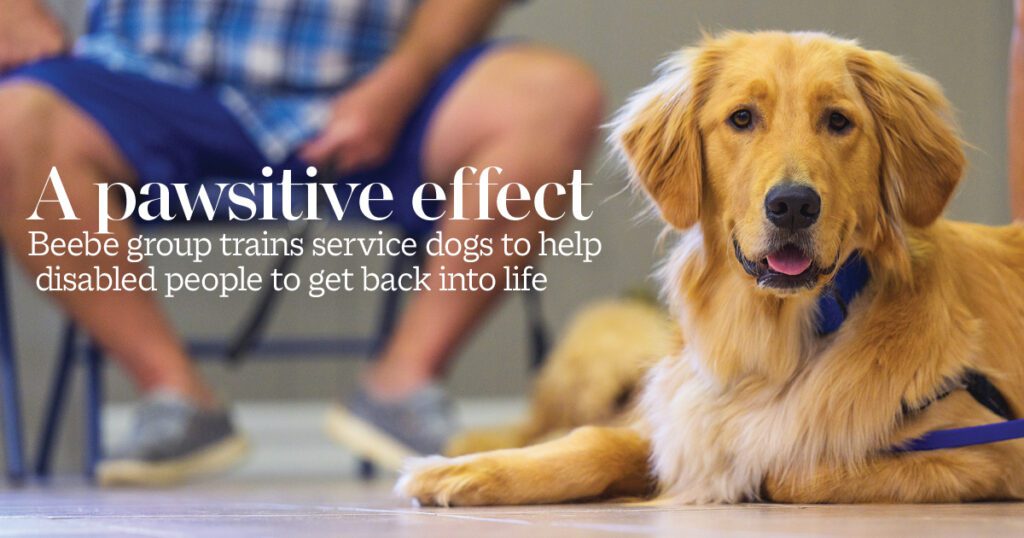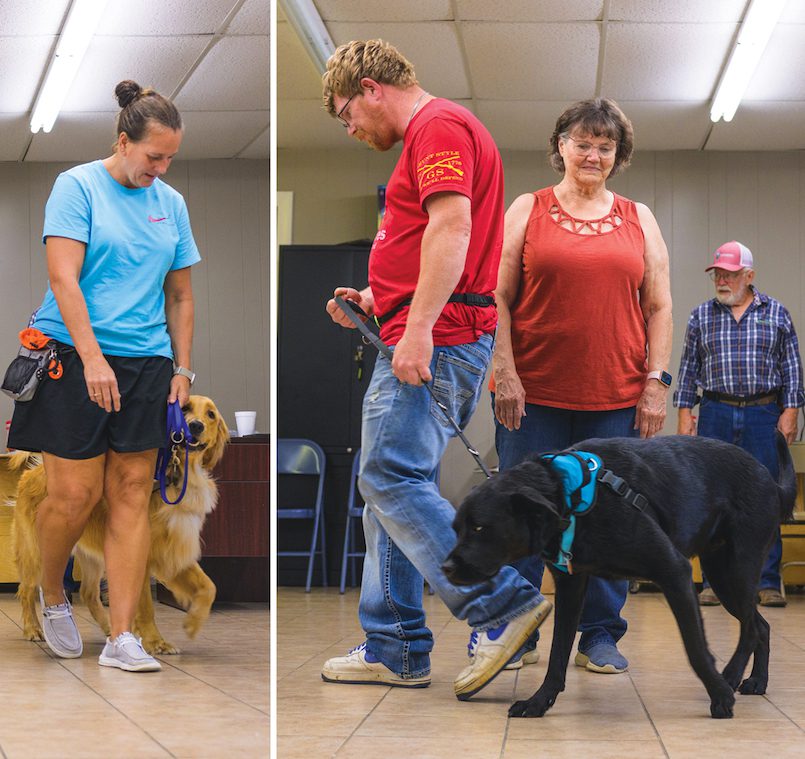01 Jul 2023 A pawsitive effect
By Rita Halter Thomas
A special class of students with remarkable skills was celebrated recently at the inaugural graduation of Arkansas Service Paws (ARSP), a nonprofit organization formed to provide service dogs and mentoring for military veterans, first responders and their qualifying dependents. ARSP salutes its first class of newly trained handlers and service dogs. Bougie (“Boo”), Cookie and Fang, now have a different kind of dog’s life.

Under the mentorship and training of ARPS, two veterans bonded and trained their own service dogs. Bougie is a 2 1/2-year-old Maltese-poodle mix, and Cookie is a 3-year-old pointer. Fang, a 3 1/2-year-old Rottweiler, was teamed with and trained by a qualifying dependent of veterans Travis and Vicki Limbaugh of Beebe.
“We started the program in August of 2022 … to fill a void we were seeing with service dogs for PTSD for veterans, their dependents and first responders,” said Travis Limbaugh, the assistant executive director and one of four co-founders of ARSP. The nonprofit includes both veterans and first responders because they suffer similar kinds of trauma. “Both populations are very service-driven. It’s all about the community, the town, the country, the state or wherever they are. It’s not about them. It’s about everybody else. So, we wanted to give back to them.”
It takes more than a pretty face or wagging tail to be a proper service dog recruit. “What we’re looking for is a dog that is calm, confident and in good health,” Travis said. “Some of the traits are natural, and some are trained.” ARSP looks for dogs that interact with people regularly, are willing to work for treats, respond to commands, and demonstrate a desire to please make the best candidates. The service dog needs the ability to pay full attention to the person it serves. Throughout the program, ARSP observes and evaluates dogs and clients, so they create a team that works best together.

ARSP has about 10 trainers and an adviser. These trainers evaluate the dogs using tests already in place, including those used for various certifications by national organizations. Clients may supply their own dogs if the dog passes the appropriate tests. If ARSP selects the dog for the client, they introduce them to the class about seven weeks into training. After several weeks of careful, intentional observation and evaluation, ARSP works with each client to match them with the most suitable canine.
Dogs are not the only ones who must qualify for the program. Only veterans and first responders, or their qualified dependents, who suffer from post traumatic stress disorder (PTSD), traumatic brain injury (TBI), or military sexual trauma (MST) may apply for the program.
However, once qualified, they are instructed on how to train their service dog to serve them in other ways. “If you come into our program with one of those three and you also have mobility support requirements, we can train the dogs to help with mobility, recognize low blood sugar issues or get medicine if someone is having breathing issues from asthma,” Travis said. ARSP doesn’t train seeing-eye dogs, as that requires a different type of training, but if they can train for it, they will do it.
Three of the ARSP co-founders are former military, and the other is the mother of two veterans. Travis’ former colleague, Wendy Cook, also a veteran, serves as the executive director and a co-founder of ARSP. Wendy and Travis, along with Travis’ wife, Vicki, and his mother, Mary Jo Blacker, formed the organization out of a shared passion for their mission. The Limbaughs’ interest grew with their daughter’s need for a service dog, which added to their motivation. Vicki is one of three primary trainers, though every trainer is important to the program.

Success stories affirm their mission. “We’ve had individuals tell us stories of people not wanting to leave their property for years because of [past trauma], and now they’re out in public weekly with their service dogs. And that’s a life-changing effect when you see it,” said Travis. “I’ve seen it in my wife and my daughter,” he said. “Our daughter is 17 and will be starting college this fall. Her service dog is helping her want to live on a college campus.” Fang accompanied Suzy at ASU Beebe this past year as a concurrent student, and they will move to UCA in the fall. “Without him, she would be in panic mode,” he said.
ARSP holds two classes per year. One starts in January, the other in June. Classes can accommodate up to 12 dogs. While only three dogs graduated ARPS’s first class, they started with five. Not all dogs will complete the training because things happen, just like with people. ARSP’s next class is poised to have as many as eight. Classes meet weekly in Ward (Lonoke County), and once classes reach public access training, they train throughout Central Arkansas.
By giving veterans, first responders and their qualified dependents the skills and support they need to train their own service dogs, ARSP is giving more than a service dog. They are teaching a skill and providing support. ARSP’s clients may learn to transform a canine companion into a service dog, but they are also transforming their own lives. That’s worth saluting.
ARSP is funded by donations, local fundraising events and grants. For more information, visit ARServicePaws.org, or find them on social media.











